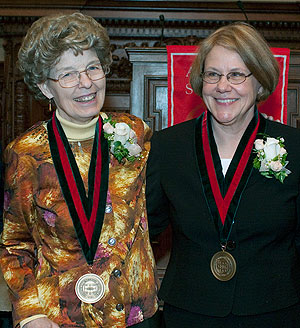Mary-Dell Chilton, PhD, who did pioneering work on plant genetics during the 1970s and early 1980s while on the biology faculty at Washington University in St. Louis, is one of three recipients of the 2013 World Food Prize, an honor often described as the “Nobel Prize of Biotechnology.”
U.S. Secretary of State John Kerry presided over a ceremony June 19 where Chilton and the two other laureates, Robert T. Fraley, PhD, chief technology officer at St. Louis-based Monsanto, and Marc Van Montagu, PhD, of Belgium, were named the 2013 laureates of the prestigious World Food Prize.
The prize is the foremost international award recognizing individuals who have enhanced human development by improving the quality, quantity or availability of food in the world.
The three researchers were recognized for “revolutionary biotechnology discoveries that unlocked the key to plant cell transformation.”

While on Washington University’s faculty, Chilton led a collaborative research study that produced the first transgenic plants. This pioneering work led directly to the field of genetic engineering of foods and plants.
Chilton’s groundbreaking molecular research showed how a plant bacterium could be adapted as a tool to insert genes from another organism into plant cells, which could produce crop varieties with new innovative traits.
Chilton currently is a distinguished science fellow and principal scientist II at Syngenta Biotechnology Inc., located in Research Triangle Park, N.C. Syngenta supplies crop protection and seed products and develops all of its genetically modified (GM) crop seeds. Her contributions to the biotech company are such that her portrait hangs prominently within the administrative and conference center that bears her name.
In 1996, as a direct consequence of her research, Ciba-Geigy — now Syngenta — became the first company to commercialize a GM trait in corn. By 2012, transgenic crops were being grown on more than 170 million hectares by more than 17 million farmers.
Chilton has served in a number of key roles at Syngenta since leaving WUSTL in 1983 as associate professor of biology in Arts & Sciences.
Before joining the WUSTL faculty in 1979, Chilton worked as a postdoctoral researcher and research faculty member at the University of Washington. She earned undergraduate (with highest distinction) and graduate degrees in chemistry from the University of Illinois at Urbana-Champaign.
While at the University of Washington, Chilton led a team from three departments in a study of how a bacterium can cause tumors (gall) to grow on plants. They found that the bacterium carried tumor-inducing genes that it specifically transferred into the plant cell, making them grow rapidly. Chilton recalls the irony of giving cancer to tobacco plants, which were the white rats of the plant kingdom.
At Washington University, her group studied how this worked and found a way to “disarm” the tumor-inducing genes and get the bacteria to insert genes for crop improvement. In a collaboration with Andrew Binns, PhD, of the University of Pennsylvania, Chilton’s team produced the first transgenic plant and showed that it passed the new trait to its progeny.
In 2002, Chilton joined the list of such scientific luminaries as Thomas Edison and Marie Curie as the recipient of The Franklin Institute’s Benjamin Franklin Medal in Life Sciences. Other major honors include being inducted into the National Academy of Sciences in 1985 and the American Academy of Arts and Sciences in 1993.
In 2009, Washington University named biology Professor Barbara A. Schaal as the inaugural recipient of an endowed faculty professorship, the Mary-Dell Chilton Distinguished Professor in biology in Arts & Sciences. Today, Schaal is also dean of the faculty of Arts & Sciences.
Speaking at the March 9, 2009, installation ceremony, Washington University Chancellor Mark S. Wrighton noted that the professorship honors two of Washington University’s pioneering women biologists.
“This is a proud moment in Washington University’s history,” Wrighton said. “While conducting research in the biology department in the late 1970s, Mary-Dell Chilton, PhD, made an astonishing discovery that led to the emergence of the new scientific field of plant genetic engineering. This discovery revolutionized plant science and gave plant geneticists who followed, such as Barbara Schaal, the ability to translate that knowledge into improving the world’s food crops.”
Schaal’s research, which has been published in more than 150 scholarly journals, involves studying the evolutionary genetics of plants, with the goal of applying that research to enrich plants such as the cassava, which serves as a major food source for sub-Saharan African populations.
Schaal’s team studies the use of DNA sequences to understand evolutionary processes such as gene flow, geographical differentiation and the domestication of crop species.